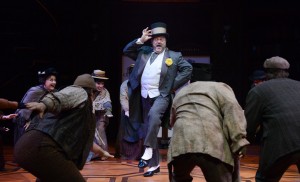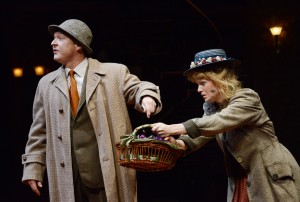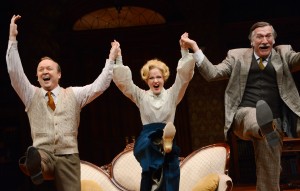I’ve been writing about shows at the Pittsburgh Public Theater for a few seasons now, and I have to tell you, I was both thrilled and a little hesitant for this season’s production of My Fair Lady. While I love the theater and I love musicals, I’ve never been that type of homosexual who just gushes over show tunes and productions like this. Heck. But prepare yourself, I think I’m about to gush for 500 words or so. Musicals actually come in many flavors, and the Lerner and Loewe type is one that really works for me. It is campy and fun, with a message tucked inside beautiful music, lyrics and dance numbers. Mix luscious sounds, with equal parts vaudeville, love story, comic timing, and pageantry and there you have it. So, I was hooked from the first note of the overture. What I didn’t expect however, was the way a chord hit towards the end of the overture whisked me back to a South Hills living room where my mother would yell to turn the stereo down as I sang along with every character on the original Broadway recording.
 PPT hits all the right notes for this show between the set, lighting, staging and costumes— and of these elements, the costumes were especially tremendous. But the real high notes of the production are the performers who individually as well as in ensemble just shine. Everyone was both a standout and at the same time, fit together seamlessly. Two of my favorite characters were Joe Jackson’s Freddy, and Susan McGregor-Laine’s Mrs Higgins, while Kimberly Doreen Burns’ Eliza has received many deserved accolades in other’s reviews.
PPT hits all the right notes for this show between the set, lighting, staging and costumes— and of these elements, the costumes were especially tremendous. But the real high notes of the production are the performers who individually as well as in ensemble just shine. Everyone was both a standout and at the same time, fit together seamlessly. Two of my favorite characters were Joe Jackson’s Freddy, and Susan McGregor-Laine’s Mrs Higgins, while Kimberly Doreen Burns’ Eliza has received many deserved accolades in other’s reviews.
I can admit however, this was the first show I’ve seen at the O’Reilly Theater, which I thought lent itself better to a proscenium stage. Truly, they made it work in three quarter thrust, but unlike many shows where the relationship of audience and action helps bring the characters to life, here, it felt as if the play was merely fit into the space while adding nothing to the story telling.
 For a few weeks, I’ve been drafting a part of this post in my mind. What more appropriate show could there be for LGBTQ viewers than My Fair Lady– a musical about the story of an arrogant sexist man who comes to understand that the value of a person comes not from what they say or do, but from the dignity and respect with which we choose to see them. Or from another queer angle– a story about a young woman who wants to change herself to be more acceptable, only to come to learn that she was enough from the very start. Who doesn’t need to be reminded that we are all princesses already, underneath the trappings of culture, status, and rank? For a show where there is nothing even remotely gay, it is an extremely queer story to be sure.
For a few weeks, I’ve been drafting a part of this post in my mind. What more appropriate show could there be for LGBTQ viewers than My Fair Lady– a musical about the story of an arrogant sexist man who comes to understand that the value of a person comes not from what they say or do, but from the dignity and respect with which we choose to see them. Or from another queer angle– a story about a young woman who wants to change herself to be more acceptable, only to come to learn that she was enough from the very start. Who doesn’t need to be reminded that we are all princesses already, underneath the trappings of culture, status, and rank? For a show where there is nothing even remotely gay, it is an extremely queer story to be sure.
 This would be (perhaps it has been) an easy show to overlook and ignore from a feminist and contemporary viewpoint, and just isn’t performed all that much. My husband, who is younger than me, didn’t know any of the music before the proverbial curtain went up, and this astounded me. He had heard, “I could have danced all night” but had no idea where it came from. How easy it is to pigeon-hole this as a story about sexism, privilege, and male arrogance, but I think it is so much more than that. I hope contemporary audiences will think to look past those overgeneralized ideas. In so many ways, Eliza is the strong woman protagonist from beginning to the end, and never plays the victim. That doesn’t mean, she doesn’t get hurt, but rather than wallowing in it, she continually makes choices about what she wants, based on her mind, her integrity, as well as her heart. She can be seen as the quintessentially strong woman capable of accomplishing much and not being dragged down by the limits of her culture or period of history.
This would be (perhaps it has been) an easy show to overlook and ignore from a feminist and contemporary viewpoint, and just isn’t performed all that much. My husband, who is younger than me, didn’t know any of the music before the proverbial curtain went up, and this astounded me. He had heard, “I could have danced all night” but had no idea where it came from. How easy it is to pigeon-hole this as a story about sexism, privilege, and male arrogance, but I think it is so much more than that. I hope contemporary audiences will think to look past those overgeneralized ideas. In so many ways, Eliza is the strong woman protagonist from beginning to the end, and never plays the victim. That doesn’t mean, she doesn’t get hurt, but rather than wallowing in it, she continually makes choices about what she wants, based on her mind, her integrity, as well as her heart. She can be seen as the quintessentially strong woman capable of accomplishing much and not being dragged down by the limits of her culture or period of history.
And while “50 Shades of Grey” fills our movie theaters with a far more titillating tale of power and gender dynamics, the reality is that this base story line about gender myth, expectations, vulnerability, and choice has been told over and over in many ways, including here, in My Fair Lady.
PS: Since writing this, I have been informed that the song, “Why can’t a woman be more like a Man, is extremely gay.